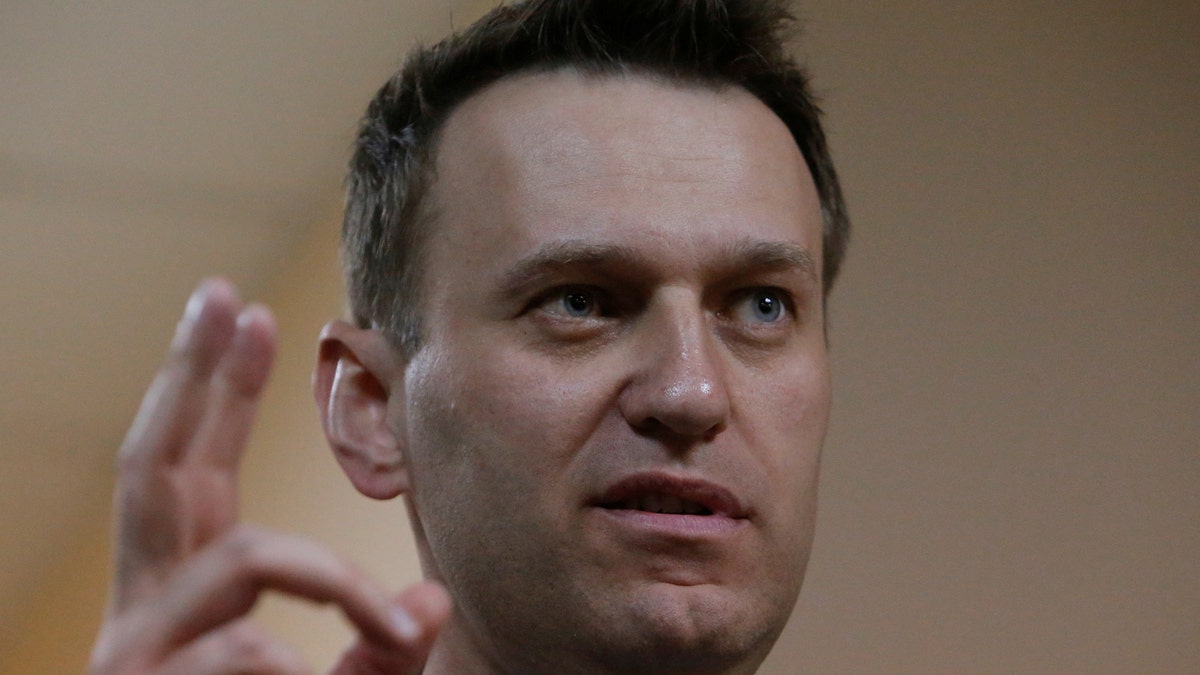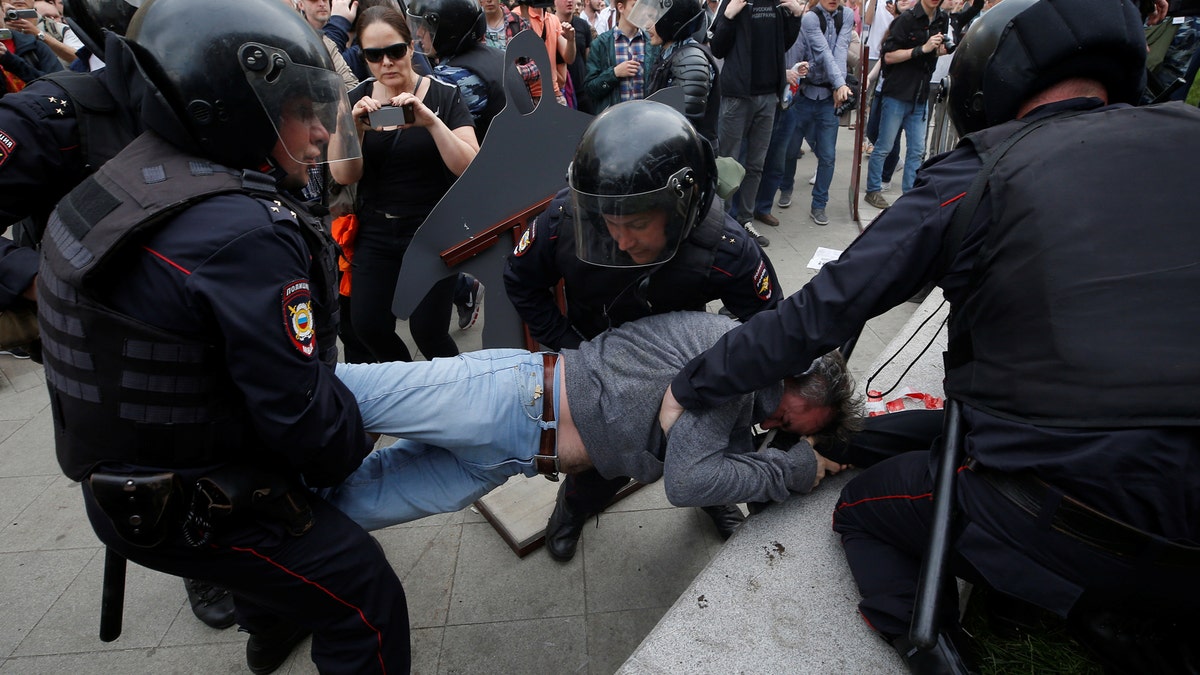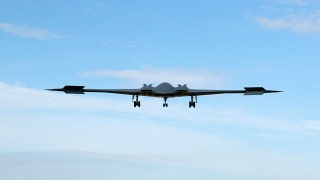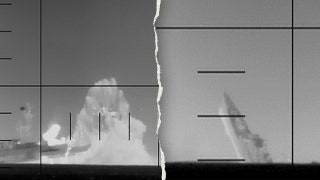
Russian leading opposition figure Alexei Navalny. (REUTERS/Sergei Karpukhin)
Alexei Navalny, the man who is planning to challenge Russian President Vladimir Putin in the 2018 Russian presidential election, was just arrested.
Here’s a quick breakdown of who he is, why he was detained, and why it seems that will do little to dissuade his political ambitions.
Who is Putin critic Navalny? Alexei Navalny is a Russian activist and lawyer who has announced his intentions to challenge President Vladimir Putin in Russia's 2018 election. He is perhaps best known for the work of his Anti-Corruption Foundation, a group he created to keep tabs on Kremlin politicians, though his documenting of alleged Kremlin abuses of power began with a blog he started nearly a decade ago. He has since amassed a loyal following of mostly younger and middle-aged Russians, with more than 2 million followers on Twitter alone. Navalny is so popular he placed second in the 2013 Moscow mayoral election. While his request for a recount was ultimately rejected, his stronger-than-anticipated finish reportedly rattled the Kremlin in a big way.
RUSSIAN OPPOSITION LEADER ARRESTED BEFORE MASS DEMONSTRATION IN MOSCOW
Why was Navalny arrested? On the eve of a series of protests he had been organizing, Navalny announced that he would be changing the location of the planned demonstration in Moscow to one of the city’s most popular streets. Navalny claims he was forced to change venues for logistical reasons, even suggesting that some contractors were being pressured not to work with him. Russian law enforcement officials, however, are reportedly calling Navalny's decision a "provocation" intended to encourage his followers to engage in an unsanctioned, and therefore illegal, protest. The protest also happens to be coinciding with the national holiday known as Russia Day, a celebration of the nation's declaration of sovereignty. Navalny was arrested at his home before he could attend the demonstration. There have been reports that internet and electricity were cut in his office as he was being detained.

A protester is detained by riot police during an anti-corruption protest organized by opposition leader Alexei Navalny, on Tverskaya Street in central Moscow, Russia June 12, 2017. (Reuters)
Second arrest this year: Navalny was arrested back in March after allegedly refusing police orders during a widespread day of protest (which he helped organize) that has been described as the largest the country has seen in years. The protests came just a few weeks after Navalny published the results of an investigation he and his associates had been conducting, in which he claimed Russian Prime Minister Dmitry Medvedev was allegedly concealing lucrative business deals via a web of charities run by his associates. The accompanying video presentation Navalny posted to YouTube has been watched more than 22 million times since March 2. The State Department condemned the arrest of Navalny and hundreds of other peaceful protesters, as well as the raids carried out at Navalny’s organization. Spokesperson Mark Toner added that “[t]he Russian people, like people everywhere, deserve… the ability to exercise their rights without fear of retribution.” Medvedev suggested a few weeks later that Navalny's investigation was an "absolutely false" product of people he described as "political scoundrels."
THE LATEST: HUNDREDS ARRESTED IN RUSSIAN CORRUPTION PROTESTS
Will the recent arrest deter Navalny’s presidential aspirations? “Alexei told me to pass on to us that the plan hasn’t changed,” Navalny’s wife, Yulia Navalnaya, tweeted earlier Monday. While she may have been referring to the plan to hold protests in a new and unsanctioned location, Navalny has previously made clear that he plans to continue his political campaign despite suggestions that he may be disqualified from running. In February, Navalny was found guilty of embezzlement, but was given a five-year suspended prison sentence. He denies wrongdoing, and suggests the charges were trumped up to prevent him from following through with his presidential run. However, Russian law reportedly stipulates that being sentenced to prison time for a crime such as embezzlement is a disqualifying factor for anyone trying to run for political office. Navalny believes that because his sentence was suspended, the constitution legally allows him to run.
A controversial figure: Navalny says accusations that he represents a dangerous form of Russian nationalism are part of a coordinated attempt to sabotage his movement. In response to claims that he views some groups as second-class citizens, Navalny has argued that he himself is half-Ukrainian, and detests the notion of second-class citizen entirely. He is frequently criticized for his 2007 call for the legalization of firearms, and his previous attendance at the Russian March, a yearly rally featuring neo-Nazi groups and imagery.
So strong, so dangerous or so free? After interviewing Navalny for a piece in The New Yorker, Masha Gessen had this to say about what she called the "very strange form of freedom" being enjoyed by this potential Putin presidential challenger: "The strangest thing about Alexey Navalny is that he is walking around Moscow, still. Here is what has happened to the other men who headlined the Russian protests in 2011 and 2012: Boris Nemtsov, the liberal, is dead, shot in view of the Kremlin in February of last year; Sergei Udaltsov, the radical leftist, is in jail, serving a four-and-a-half-year sentence for allegedly plotting to overthrow the Russian government; Garry Kasparov, the chess champion who became a politician, is in exile, as are many others. Meanwhile, Navalny is living in Moscow and openly running several political projects... Since Navalny’s prison sentence was aborted, he has continued to occupy a unique space in Russian society: he is a man so strong, or so dangerous, or so free—or all of those things—that the usual Kremlin tools cannot work against him."








































